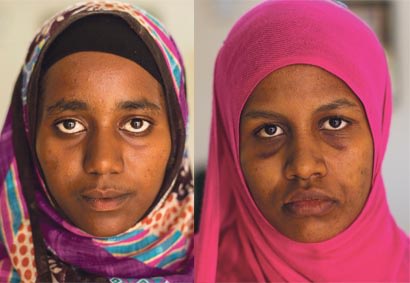
Two maids have spoken of the appalling abuse they claim was dished out by their employers, as a top diplomat called for an end to household “slavery”.
They have now sought refuge at the Ethiopian Consulate in Dubai.
Hedja, speaking to 7DAYS yesterday, told of the horrors she endured during the two years she worked for a Kazakh family in Ajman. She said her female employer didn’t like the prospect of the maid speaking to her husband.
She said: “My employer didn’t want me talking to her husband. Every time her husband would instruct me to do something, she would beat me.”
Hedja said the woman even cut off her hair to make her “less attractive”.
Hedja, who earned Dhs500 per month, said the abuse began three months after she started her job. She decided to escape last week when her employer accused her of stealing car keys and beat her.
“I saw the door open and I ran,” she said. I asked someone for water, they called the police for me. I’ve been at the consulate since. I want to go home.”
She has dropped the police case she had filed against her employer but the consulate says it intends to file a new one.
Wube worked for an Emirati family in Dubai and claims at one point she was starved for two days then shown a plate of food, which she thought was hers, only for her employers to throw it in the bin.
Ethiopia’s Consul General in Dubai, Yibeltal Aemero Alemu, said he is seeing “a lot” of such cases, branding it “slavery.”
Housemaid Wube Tamene dreamed of a new life and a decent standard of living in the UAE.
Instead she was made to cut up her clothes and clean her employer’s home with the rags.
The Ethiopian, aged just 18, claims she was also made to walk around in bare feet and was not paid a salary for 18 months.
She also claims she was regularly beaten. Wube is now seeking refuge at the Ethiopian consulate in Dubai, along with fellow maid Hedja Ousman, who escaped an abusive employer – a Kazakh woman – in Ajman.
Their cases have prompted Ethiopia’s Consul General in Dubai, Yibeltal Aemero Alemu, to call for such “slavery” to stop.
Alemu said the consulate is now seeing “a lot” of cases in UAE and has said his office would begin pursuing cases against abusive families.
He said: “These maids have no communication to the outside world, they’re starved and beaten – this is slavery.
“They’re not allowed to have mobile phones. To exploit the maids employers don’t let them communicate with their families back home, so they won’t run away for other opportunities.”
Recalling her abuse, Wube said: “When my employer wanted to get rid of me she made me sign a contract in Arabic that I have settled everything with her. But I didn’t understand what I was signing.
“She took me to the airport without shoes and any luggage, gave me my flight tickets and asked me to leave.
“But I was stopped by authorities. They said ‘where are you going without shoes?’” Consul-General Alemu said Wube has now received her outstanding salary of Dhs9,000 and will be heading back to Ethiopia today.
Ethiopia currently has a ban on its nationals coming to the UAE as domestic workers, but Alemu said the two maids started work before his government implemented it last year. Addis Abada said such a ban would remain in place until there is an agreement reached to protect its nationals from abusive employers.
“There are 90,000 Ethiopians in the UAE and most of them are maids,” Alemu said.
Lola Lopez founder of the humanitarian group Babies Behind Bars, which also helps maids who are abused, said some were being denied basic human rights.
She said: “Some people have no regard for human life. Welfare organisations haven’t been able to help much, because the message they send out doesn’t always reach the women it’s supposed to. Many of these maids don’t read the newspaper and they don’t have phones.
“No one can be denied basic human needs.”
sarwat@7days.ae
=>yahoonews
No comments:
Post a Comment